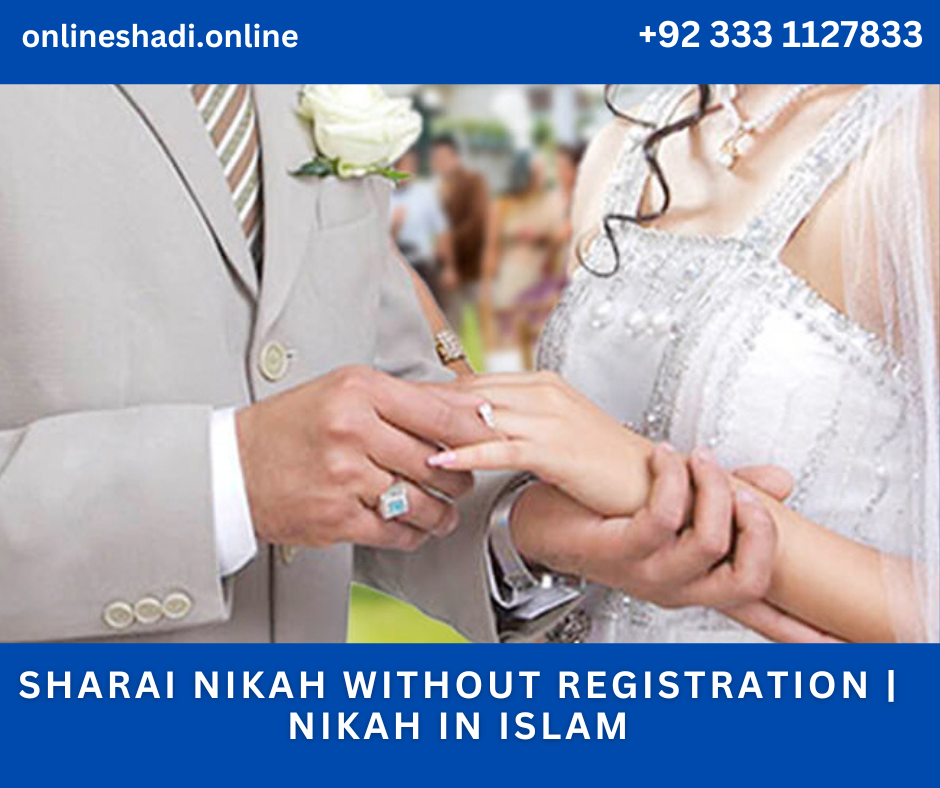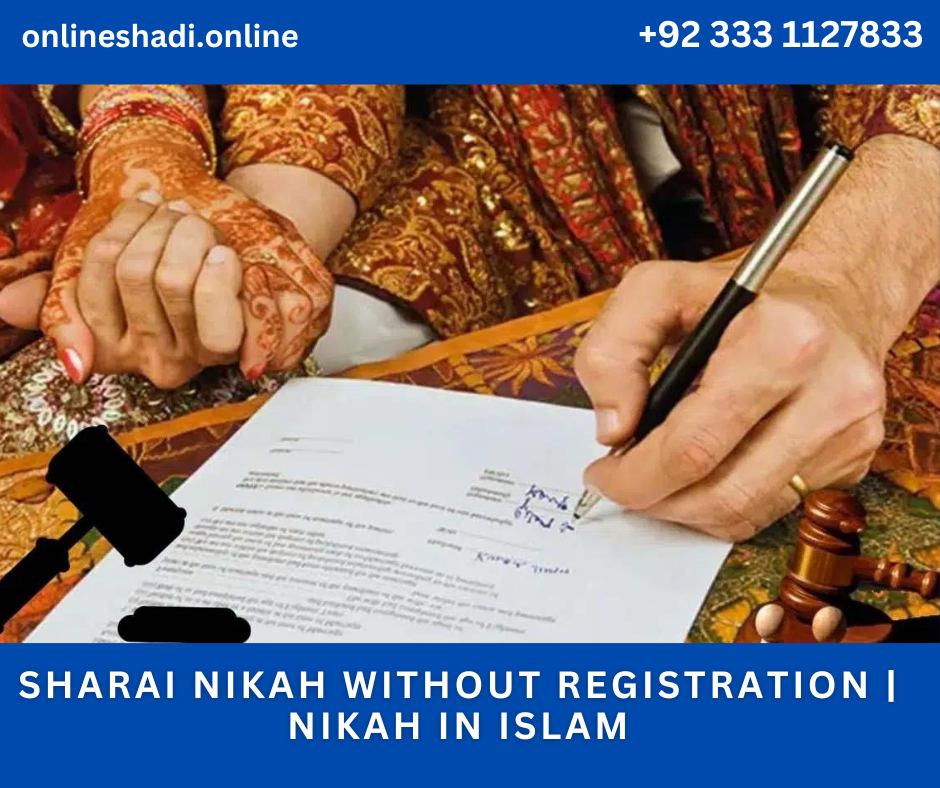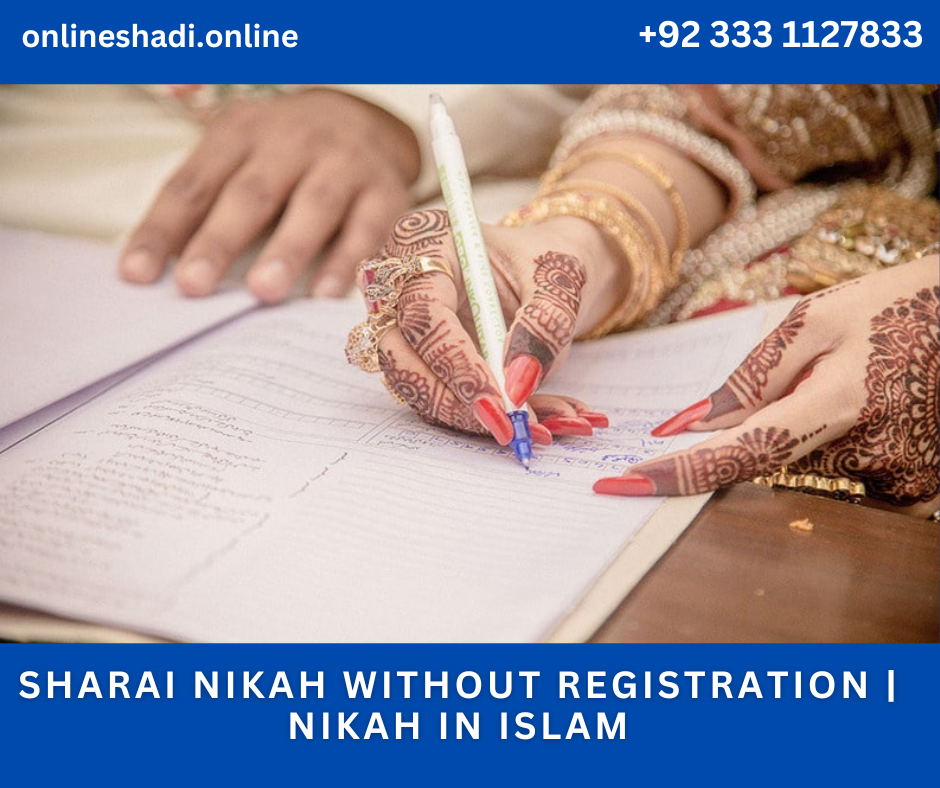Sharai Nikah Without Registration | Nikah in Islam
Sharai Nikah Without Registration: Islamic Sharai Nikah’s Validity
Sharai Nikah (religious marriage contract) performed according to Islamic precepts is considered a valid marriage before Allah, even without government registration. Expand the core elements of a Sharai Nikah, which involve a proposal and acceptance by both spouses, the presence of qualified witnesses, and the bride’s payment of Mahr (dowry).expand_more However, the absence of registration might lead to complications in proving the marriage’s validity, especially in matters concerning inheritance, child custody, and legal disputes.
Conditions of a Valid Sharai Nikah vs. Registration Requirements
While a Sharai Nikah focuses on religious requirements like the proposal above, acceptance, witnesses, and Mahr, government registration procedures often involve additional legalities. These may include filing applications, submitting documents like ID proofs, and undergoing medical tests. Exclamation Fulfilling these registration requirements doesn’t necessarily affect the Islamic validity of the Sharai Nikah, but it provides a legal document as proof of marriage for future reference.
The Importance of Sharai Nikah vs. Government Registration
Both Sharai Nikah and government registration hold significance in a Muslim marriage. The Sharai Nikah establishes the marriage contract before Allah, fulfilling religious obligations and granting the spouses Islamic rights. Government registration, on the other hand, provides legal validation and protects the couple’s rights in matters like inheritance, property ownership, and social security benefits. Both processes should be completed to ensure a religiously sound and legally recognized marriage.
Consequences of Unregistered Sharai Nikah: Islamic and Legal Viewpoints
While a Sharai Nikah performed Islamically is valid in the eyes of Allah, the absence of registration can lead to complexities. Exclamation Islamically might not have repercussions, but proving the marriage’s legitimacy for inheritance or resolving disputes becomes difficult. The court system might not recognize unregistered marriages, potentially jeopardizing spousal rights and causing difficulties in obtaining official documents for children.

Does Sharai Nikah Guarantee Spousal Rights Without Registration?
A Sharai Nikah performed according to Islamic guidelines establishes the religious foundation of a marriage. It grants the spouses Islamic rights, such as living together, intimacy, and inheritance (if the marriage is consummated). However, enforcing these rights legally might be challenging without government registration. Registered marriages provide a legal document that can be used to claim spousal rights in court if necessary.
Validity of Unregistered Sharai Nikah for Inheritance in Islam
While a Sharai Nikah establishes a valid marriage Islamically, the absence of registration might affect inheritance rights. Islamic inheritance laws allocate portions of the deceased’s estate to spouses and children. Unregistered marriages can make it challenging to prove spousal status and children’s legitimacy, potentially leading to inheritance disputes and depriving rightful beneficiaries.
Scholarly Opinions on the Necessity of Registration for Sharai Nikah
Islamic scholars generally agree that a Sharai Nikah performed according to Islamic rites is a valid marriage. However, opinions differ on the necessity of government registration. Some scholars advocate for registration’s importance due to its legal benefits. Others emphasize the importance of the Sharai Nikah itself while acknowledging the practical advantages of registration.


Can an Unregistered Sharai Nikah Lead to Zina (Adultery) in Islam?
No, an unregistered Sharai Nikah does not constitute Zina (adultery) in Islam. The marital relationship is legitimate if the Sharai Nikah follows Islamic requirements. However, the lack of registration can create complications in proving the marriage’s validity, which might be necessary in legal situations like accusations of adultery.
Strengthening Marriages: Sharai Nikah Alongside Registration
Combining a Sharai Nikah with government registration strengthens a Muslim marriage. The Sharai Nikah fulfills religious obligations and establishes the marriage before Allah. Registration provides legal validation, safeguards spousal rights, and ensures a smoother process for inheritance, child custody, and other legal matters. This two-pronged approach fosters a marriage that is religiously sound and legally recognized.
Sharai Nikah Without Registration: Impact on Children’s Rights
Children born from a Sharai Nikah, even unregistered, are considered legitimate in Islam. However, the absence of registration can make obtaining official documents like birth certificates easier. This can disadvantage children in areas like education, healthcare, and travel. Registering the marriage after the Sharai Nikah can ensure children’s rights are protected and they can access essential documents.
Registering After Sharai Nikah: Remedying Validity Concerns
Even if a couple performs a Sharai Nikah without initial registration, they can rectify the situation by registering the marriage later. This can eliminate concerns about the marriage’s validity and provide legal documentation for future reference. The process for registering a Sharai Nikah after the fact might vary depending on the local jurisdiction.

The Role of Witnesses in Sharai Nikah and Registration Processes
Witnesses play a crucial role in both the Sharai Nikah and registration processes. In a Sharai Nikah, qualified witnesses must testify to the marriage’s occurrence. During registration, witnesses might be needed to verify the couple’s identities and the legitimacy of the marriage documents.
Evidence of Sharai Nikah in Case of Unregistered Marriage
If a Sharai Nikah wasn’t registered, proving its validity can be challenging. Evidence might include witness testimonies, wedding invitations, photographs, or social media posts announcing the marriage. However, the strength of this evidence can vary, and legal disputes might arise if the evidence is contested. Registration eliminates such complexities by providing a clear, documented marriage record.
Dissolution of Unregistered Sharai Nikah: Islamic Procedures
Dissolving an unregistered Sharai Nikah still follows Islamic divorce procedures (Khula or Talaq). However, the absence of registration can make the process more complex. Legal recognition of the marriage might require a court to finalize the divorce and determine issues like spousal support and child custody. Registration beforehand streamlines the divorce process by establishing a documented marital record.
Financial Implications of Unregistered Sharai Nikah vs. Registered Marriage
Unregistered Sharai Nikah might have financial disadvantages. Spouses may face difficulties claiming financial rights like maintenance or inheritance. Additionally, unregistered marriages might not qualify for certain tax benefits or social security programs available to registered couples. Registration ensures financial security and protects the couple’s rights in economic matters.
Mahr (Dower Money) in Sharai Nikah and its Relation to Registration
Mahr (dower money) is a mandatory element of a Sharai Nikah. The amount and payment of Mahr are a private agreement between the bride and groom. Registration has no direct impact on Mahr itself. However, a registered marriage can provide a record of Mahr payment, potentially aiding in legal disputes if the groom fails to fulfill his obligation.
Seeking Legal Advice Regarding Unregistered Sharai Nikah
If you need clarification on the implications of an unregistered Sharai Nikah, consult a lawyer specializing in Islamic family law. They can advise on the validity of the marriage in your specific jurisdiction, potential legal issues, and the benefits of registering the marriage.
The Sharia Court’s Role in Unregistered Sharai Nikah Cases
Sharia courts can intervene in unregistered Sharai Nikah cases, mainly regarding divorce, inheritance disputes, or child custody issues. The court will assess the evidence of the Sharai Nikah and may consider witness testimonies or circumstantial proof. Registration eliminates the need for such procedures and allows the Sharia court to focus on resolving the legal matter.


Can Unregistered Sharai Nikah Lead to Polygamy Issues?
An unregistered Sharai Nikah doesn’t directly create issues with polygamy. However, the lack of registration can make it easier for a man to conceal additional marriages, potentially violating Islamic rules on polygamy and spousal rights. Registration creates a documented record, making it more challenging to hide existing marriages.
Maintaining Islamic Guidelines During Sharai Nikah Without Registration
Even without registration, a couple can uphold Islamic guidelines during a Sharai Nikah by ensuring it fulfills all religious requirements like proposal, acceptance, witness presence, and Mahr payment. However, registration doesn’t negate the spiritual validity of the marriage. Both processes can be completed to achieve a religiously sound and legally recognized marriage.
The Evolving Landscape of Sharai Nikah and Government Registration
The landscape of Sharai Nikah and government registration is constantly evolving. Some countries might integrate Islamic marriage principles into their registration processes. Conversely, legal interpretations of unregistered marriages might change over time. Staying informed about relevant laws and regulations in your region is crucial.
